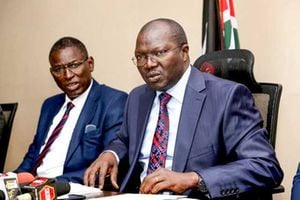Nandi Governor Stephen Sang faces criticism in face-off with Cleophas Lagat

Former Nandi governor Cleophas Lagat (left) and Governor Stephen Sang at a past function in the county.
As the race for the Nandi governor seat turns into a rematch between incumbent Stephen Sang and his predecessor Dr Cleophas Lagat, party loyalty, land and management of public resources are some of the factors that will determine the outcome of the polls.
The race has been complicated after six other losers in the United Democratic Alliance (UDA) party nominations rallied behind Dr Lagat to dethrone Mr Sang.
A list published in the Kenya Gazette by Independent Electoral Boundaries Commission (IEBC) names the independent candidates as Lagat Elijah Kiptarbei, Tirop Antipas Kisorio, Serem Kibet Anderson, Boor Joseph Kiptarus, Maiyo Peter Kipkemboi, Koech Nicholas Tirop as Lagat Cleophas Kiprop.
In a new political twist, Dr Lagat has settled on Mr Kiptarbei as his running mate after the rest of the independent candidates dropped their bids to rally behind the former governor.
Under the new power sharing formula, Mr Tirop will head the Finance docket while Mr Serem will be the county assembly Speaker if they win. Mr Maiyo will take the county secretary position while Mr Koech will be the Roads and Infrastructure executive.
The county, with 402,856 registered voters in six constituencies, has a history of voting as a bloc, so the entry of independent candidates will introduce a twist to the voting pattern.
Dr Lagat pledges to revamp the agriculture sector, develop infrastructure to ease access of agricultural produce to the market, tackle historical land injustice and deal with the employment crisis in the region, among other pressing issues. He is also keen to complete pending projects that have stalled since he was voted out.
Equity in employment
“My administration will guarantee equity in employment opportunities and ensure that all pending bills are settled. The public will get value for their money to facilitate socio-economic transformation to attain better living standards,” said Dr Lagat.
Dr Lagat is also banking on his past achievements, including provision of piped water, revamping of cattle dips and expansion of higher learning through the setting up of Koitalel Samoei University College.
Away from party politics, the land factor, especially expired leases for land owned by multi-national tea companies, will be a key factor in the gubernatorial race.
Most of the tea companies are located in Nandi Hills and leaders in the region have been advocating for compensation for families displaced by settlers.
“Any candidate who will come out as a defender of the land rights will have an upper hand,” said Wilson Kemboi, a political analyst in the region.
He added: “Land remains an emotive matter and candidates should not capitalise on the matter to get sympathy votes.”
During his tenure, Dr Lagat had allocated Sh108 million to sue the British for the displacement. The suit is yet to kick off.
Workers in the tea estates form a big voting block that has, in recent times, tilted the outcome of the elections, especially in Tindiret and Nandi Hills constituencies, but this could be the case in the governor race, too.
Other contentious land issues include the Kimwani Agricultural Development Cooperation (ADC) which has in the past been invaded by squatters claiming ownership. Some of the ADC farms in the region were dished out to influential personalities during the Moi era.
Religion and financial muscle are other factors to watch in the governor’s race as the candidates.
“Money matters a lot during the campaign period and any candidate should be ready to dish out cash and other goodies to increase chances of clinching the seat,” said David Rono, a Kapsabet resident.
How funds are allocated for development purposes is also a key factor in Nandi politics, with Mr Sang in a defensive position.
Six lawmakers in the county – Alfred Keter (Nandi Hills), Cornelly Serem (Aldai), Vincent Tuwei (Mosop), Julius Meli (Tindiret), Wilson Kogo (Chesumei) and Samson Cherargei (Senator) –have in the past taken issue with Mr Sang over stagnated development projects and rampant corruption, claims the governor has dismissed.
Mr Cherargei, for example, said most projects have either stalled or remain unimplemented.
“There are several projects that have not been started but unsupported documents indicate that they are complete. The governor should explain to us which projects he has implemented since he took office,” said the senator.
A lot of promises
Mr Serem claimed Mr Sang has failed to transform the county in spite of making a lot of pre-election promises in the last General Election.
“When the governor was elected he made a lot of promises, including the upgrade of all the roads and employing ECDE teachers but most of these have remained empty promises,” said the legislator.
Mr Tuwei regretted that the county had lagged behind in terms of development due to mismanagement of resources in the county.
But Mr Sang has on several occasions defended his track record saying that his critics are being sponsored by land cartels out to grab public utilities.
“My track record is clean and the lawmakers are fighting me because of my firm stand in defending public land. Some these people claiming there is looting and mismanagement of public resources have pending corruption related cases,” said Mr Sang adding that his priority was to defend the rights of the electorate.
While courting voters to give him a second and final term in office, Mr Sang promises to complete pending projects and initiate new ones.
He is a devoted associate of Deputy President William Ruto, who is out to succeed President Uhuru Kenyatta. The governor has said that his administration will implement the bottom-up economic model to empower the devolved unit socio-economically.
TOMORROW: Makueni County, where race to succeed Prof Kivutha Kibwana is heating up






